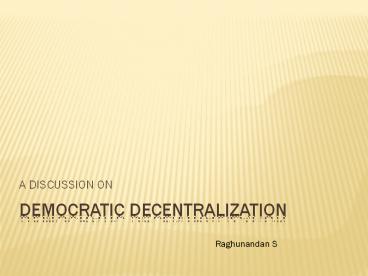Democratic Decentralization - Discussion - PowerPoint PPT Presentation
Title:
Democratic Decentralization - Discussion
Description:
Concept presentation on democratized decentralization – PowerPoint PPT presentation
Number of Views:294
Title: Democratic Decentralization - Discussion
1
Democratic decentralization
- A DISCUSSION ON
Raghunandan S
2
My idea of village swaraj is that it is a
complete republic, independent of its neighbors
for its own vital wants, and yet interdependent
for many others in which dependence is a
necessity." Mahatma Gandhi
3
Decentralization is the process of redistributing
or dispersing functions, powers, people or
things away from a central location or authority.
4
Decentralization means transfer of planning,
decision-making or administrative authority from
the central government to its field
organizations, local administrative units,
semi-autonomous organizations, local governments
or non-governmental organizations.
Participation and control of governance by the
people of the country is the essence of democracy.
5
Democratic decentralization can be defined as
meaningful authority devolved to local units of
governance that are accessible and accountable to
the local citizenry, who enjoy full political
rights and liberty. It thus differs from the vast
majority of earlier efforts at decentralization
in developing areas. Blair (2000 21).
6
The greater the power of the panchayats the
better for the people. - Mahatma Gandhi.
7
The principle thrust of Balwanta Rai Mehata
Committee report was towards decentralization on
democratic institutions is an effort to shift
decision centers close to the people to enable
their active and continuous participation under
local popular control.
The Ashok Mehata committees principal thesis was
the functional necessity for decentralization of
administration level closer to the people.
8
Both Balwanth Rai Mehata Committee report and
Ashok Mehata Committee reports can be considered
as landmarks in the history of democratic
decentralization in India.
With the introduction of the 73rd and the 74th
Constitutional Amendments, the decentralization
has been democratized.
9
The 73rd Amendment covers many areas that would
enable the Panchayats to improve the lives and
wellbeing of poor and vulnerable groups.
Moreover, it contains specific provisions that
guarantee the participation of traditionally
excluded groups, and transparency for local
institutions such as the Gram Panchayats and the
Gram Sabha.
10
The crux of democratic decentralization lies in
concept of decentralized political as well as
fiscal blocks where members (people) can find
their own way of solution to address their issues
regarding development.
11
THANK YOU































